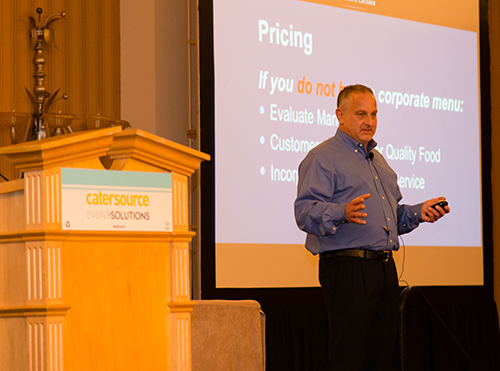“When I call a vendor with a problem, I expect them to solve it—quickly. We’re a no-nonsense company that delivers the finest customer service experience in our industry. I expect nothing less from our vendors.” —Canadian Real Estate Tycoon, Sol “The Hammer” Shabinsky, my uncle and mentor
To call the caterer/restaurateur and food supplier relationship a marriage isn’t far-fetched. Both sides rely on each other to put food on the table. But like all marriages, one or both sides might take the other for granted, resulting in occasional rough patches. Good communication is vital to working through these times. If the business relationship is mutually beneficial, it is worth investing time and effort the partnership.

Tips to sustaining mutually beneficial vendor relationships
Lay your cards on the table. Communicate your business goals as they relate to expectations for your vendors. If you are striving to grow your catering business, the suppliers you choose should be on board with your vision. Give them specific examples of your staff delivering exemplarily service to your customers. They need to know you expect the same from them.
Get it all in writing. Document the agreed upon terms and conditions including delivery schedule and procedures, pricing policies, product quality expectations, back-up plans, communications, payment terms, and ordering procedures.
Communicate your assessments. Be direct. If any of your expectations are not being met, let them know. We have all had the frustrating experience of losing a customer, only to later discover the reason(s). Our first thought is, “I wish they had let me know. We could have corrected the issue.” Your vendors feel the same way. If there is a problem, tell them. There may be an easy solution.
Respect them and their guidelines. Place your orders on time. Meet the minimums. When they make a delivery, check it in promptly. Offer the delivery person a beverage. Address them by their name. If they like you, your account will be a priority. You want to create an allegiance. If the driver is running late and has to decide who gets the next delivery, you want it to be you.
Be reasonable. Miscommunications, unforeseen circumstances, and mistakes are inevitable. Consider how some of your catering customers respond when they are affected by these situations. Respond to your vendors in the matter you most appreciate being treated.
Demonstrate loyalty. If it is not broken, don’t fix it. When a vendor has worked hard and has done a good job servicing your business, stay with them. When you are loyal to your vendor—especially after a mishap—they will inevitably return the goodwill. Let their bosses know that their driver and/or service representative is doing a good job for your company. This can pay long-term dividends.
Your bills. Pay your invoices on time. If circumstances necessitate a late payment, let them know in advance. Your vendor will appreciate the information, as it may affect their financial obligations.
Choosing a vendor
Product standards. The food and product delivered needs to consistently meet your standards. Having worked with many produce companies over the years, I have found the quality of their whole fruit can be a barometer for the quality of their inventory as a whole. In the event they deliver a case of lettuce that it not satisfactory, how quickly are they able to replace it? Does your poultry supplier deliver chicken breasts consistent in size and weight? If you carry retail items, does your dairy company have ample sell-by dates stamped on the products you re-sell?
Pricing structure. The best time to negotiate pricing and payment terms is before starting a relationship. Expect to provide information about your current or anticipated ordering volume, as this may affect the proposal. Discuss parameters for how long prices will be guaranteed and/or maximum percentage increases over specific time periods. Keep in mind, there is nothing wrong with asking any or all of your current suppliers to sharpen their pencils and offer more aggressive pricing. If you can shave half of a percentage point from six vendors, that could be a 3% food cost reduction.
Pricing strategy. Let potential new vendors know that you are shopping around. Under no circumstance should you divulge what you are currently paying for products they are bidding on. There may be a time when you share actual invoices from other vendors with them, but insist they show their hand first. If they ask what you are currently paying, respond, “I’d first like to see the most aggressive pricing you can offer us.” Period.
Don’t be shy to share that you’ve been around the block a few times and are all too familiar with the game of “low-balling to get the account, followed by a gradual price increase over time.” Let them know that someone on your staff is tasked with tracking all vendors pricing (someone should be doing this). While market conditions will occasionally result in occasional price increases, if they operate under the “reel ‘em in at rock-bottom pricing and inch ‘em up slowly” strategy, they are wasting your valuable time.
Payment terms. How much time do you need to pay their bills? Net/30 is typically the longest term most companies will offer. If their standard terms are Net/15 but you require longer, ask if it is negotiable. What is their policy if you need a couple of additional weeks beyond terms from time to time? Will they still deliver to you during this time?
Delivery schedule. Determine if your delivery parameters are within a vendor’s capability. If you need fresh bread and bakery items at 5:00 a.m. every morning, can they guarantee it? For other products, there may be only specific time frames when you are able to accept deliveries. How far away are they located? How many delivery trucks do they have on the road? When you need something quickly, can and will they come through for you?
Consider your vendors an extension of your staff and assume a role in cultivating partnerships with them. You don’t want “order-takers.” You want your vendor representative to keep an eye out for new products and menu items that fit your brand, and also suggest ideas that will help your business grow. They may even pass along information about your competitors. You want your suppliers, account reps, and delivery drivers to feel a vested interest in your long-term success. Remember…achieving this is a two-way street—and smart business.
If you have any questions, feel free to contact me directly at [email protected]. I’m always willing to help answer any business or catering questions!
 Mike Rosman will be teaching a half-day session on QSR/Drop Off Corporate Catering. Click here for more information.
Mike Rosman will be teaching a half-day session on QSR/Drop Off Corporate Catering. Click here for more information.



